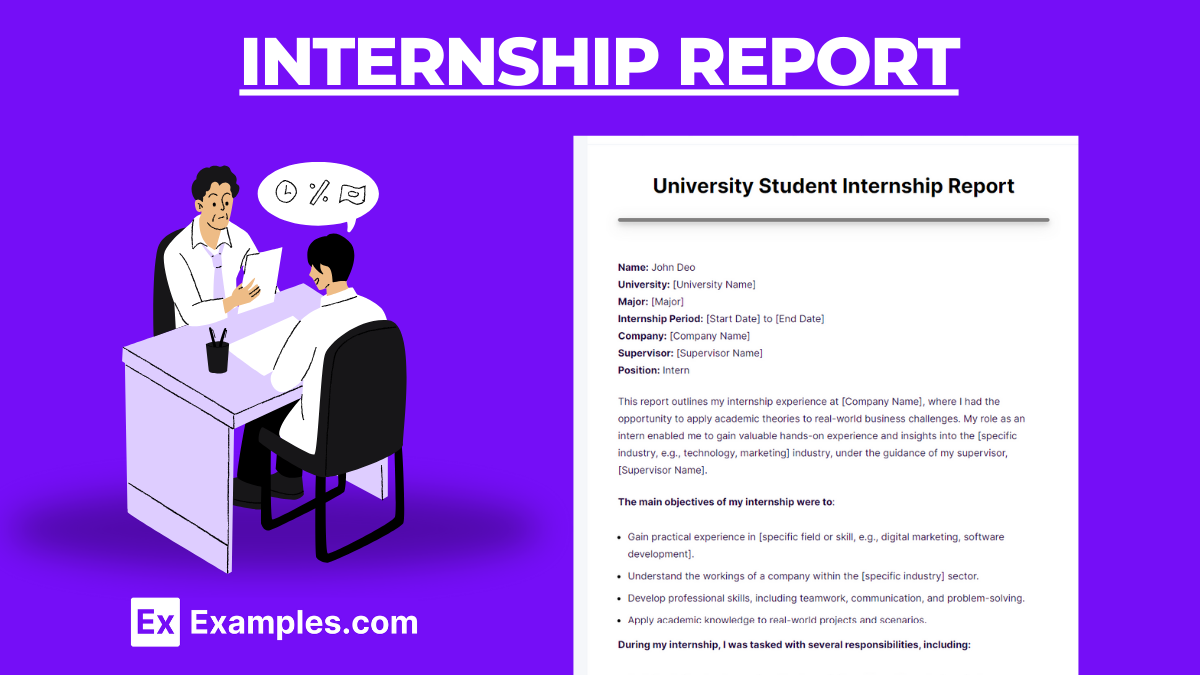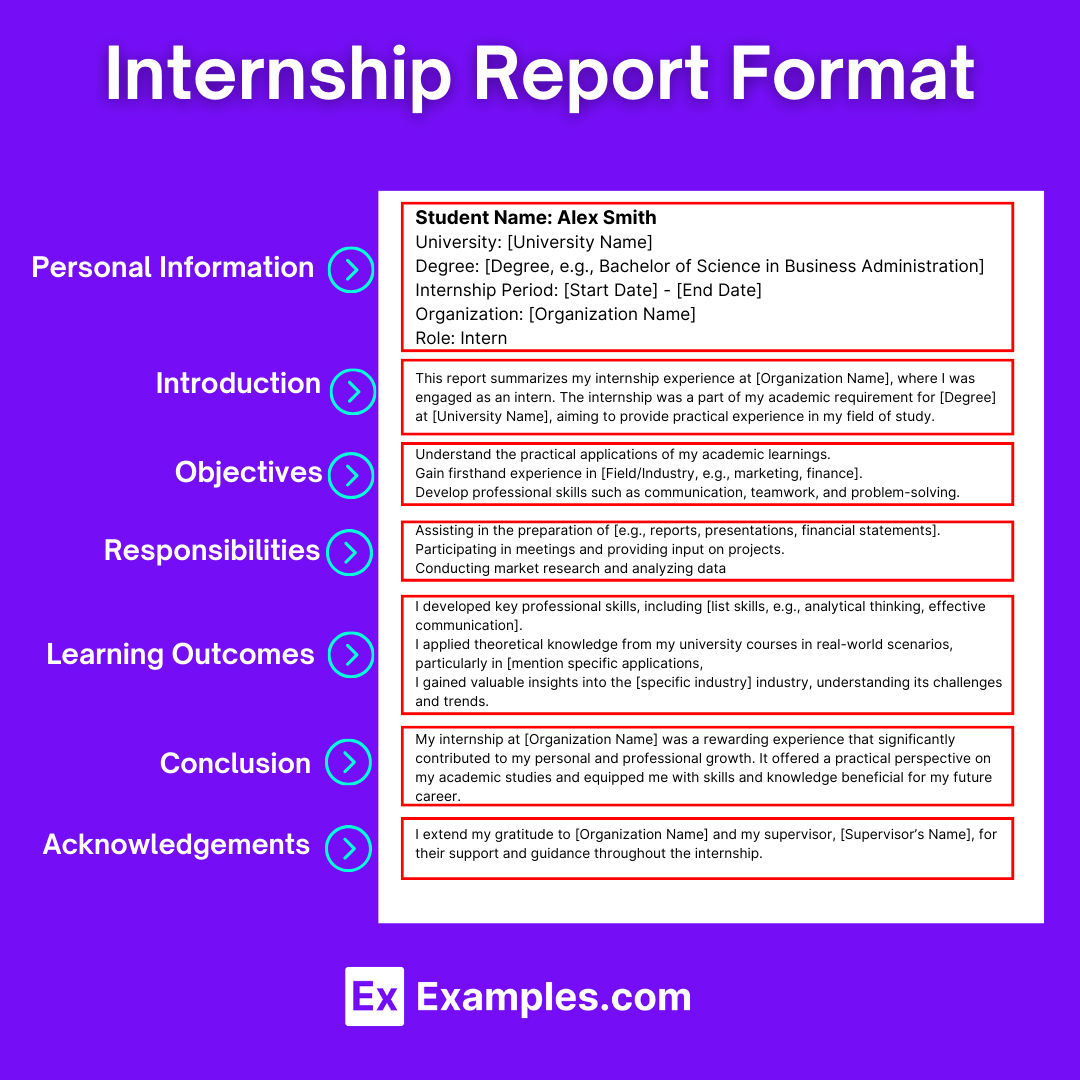20+ Internship Report Examples to Download
Students and trainees usually undergo an internship program to prepare themselves for the real world. Through this program, they are able to gain work experience for a specified requirement. This is especially common for medical report students, who spend almost half of their student lives as medical interns in hospitals and other health care institutions.
By the end of the program, interns are typically required to submit a report about their time there. Here are some free examples of the report.
What is an Internship Report?
An internship report is a comprehensive document that students or recent graduates prepare to present a summary of their internship experience. This document serves as a crucial link between practical work in a professional setting and academic learning in a classroom environment. It provides insights into the intern’s accomplishments, the skills developed,challenges faced, and the knowledge gained throughout the internship period.
How to Write an Internship Report ?
In terms of format, it may depend on what is required. Anything from font style, font size, and the number of pages will depend on the instructions given to you by your adviser. Sometimes, you are required to create a report based on different time periods of your internship as well. You may also like sample activity reports.
Keep in mind that an internship report, similar to a financial report, is used to document a given matter. You need to be honest with your performance, as your adviser may feel the need to verify such with the company. Remember to self-evaluate properly. Think about your experience and state the positive and negative side.
What to Write in an Internship Report ?
Like a performance report, an internship report will assess your overall performance throughout your internship. So for the report’s content, a executive summary of personal insights and learning shall be presented through a narrative.
Perhaps you have learned something that goes beyond the ordinary, such as personal values and characteristics that you never knew about yourself before. It’s important to highlight significant events as well. You may also see report writing examples.
Be sure to state where you had your internship and the role you played. You also need to specify the time period of your internship. Job descriptions may also be necessary. You may also check out marketing report examples.
Nature of Work Example
Nature of Work: Marketing Intern
As a Marketing Intern at XYZ Corporation, the role was multifaceted, aiming to support the marketing team in executing its digital marketing strategies and campaigns across various platforms. The nature of work encompassed the following key areas:
Content Creation: Assisted in the development and curation of engaging content for social media platforms, including Facebook, Instagram, and LinkedIn. This involved brainstorming content ideas, creating graphic designs using tools like Canva, and drafting copy that aligns with our brand voice and marketing objectives.
Market Research: Conducted comprehensive market research to gather insights on industry trends, competitor analysis, and target audience behavior. Utilized tools such as Google Analytics and SEMrush to analyze data and compiled reports to inform marketing strategies and decision-making processes.
Email Marketing: Supported the creation and distribution of email marketing campaigns. Tasks included designing email templates, segmenting target lists, and analyzing campaign performance metrics to optimize open rates and engagement.
Social Media Management: Played a role in managing the company’s social media accounts by scheduling posts, engaging with followers, and monitoring social media analytics to gauge the effectiveness of our content strategies.
Event Coordination: Assisted in organizing promotional events and webinars aimed at enhancing brand awareness and customer engagement. Responsibilities included venue selection, coordinating with vendors, and managing event promotions through various channels.
Collaborative Projects: Worked alongside team members on collaborative projects, including product launches and cross-promotion initiatives with partner brands. Contributed to team meetings with creative ideas and feedback to enhance project outcomes.
Throughout the internship, the focus was on gaining practical experience in digital marketing, enhancing creative and analytical skills, and contributing to the team’s success by providing support in various marketing initiatives.
Format/Outline of an Internship Report
Below is a standard format that outlines the key components of an effective internship report. This format can be adapted to meet specific academic or organizational requirements.
Title Page
- Report Title: Clearly state that it’s an internship report.
- Intern’s Name: Full name of the intern.
- Internship Period: Start and end dates of the internship.
- Organization Name: Name of the company or organization where the internship was completed.
- Submission Date: The date when the report is submitted.
- Course Name: (If applicable) The name of the course or program for which the internship was undertaken.
- Institution Name: The name of the educational institution or university.
Acknowledgment
- A brief section expressing gratitude towards those who provided support and guidance during the internship, including mentors, colleagues, and faculty advisors.
Table of Contents
- A detailed list of the report’s sections, including page numbers for easy navigation.
Executive Summary
- A concise overview of the internship experience, including key tasks, learnings, and outcomes. This section should provide a snapshot of the entire report.
Introduction
The introduction for internship report sets the stage, outlining the report’s purpose, the intern’s objectives, and a brief overview of the host organization. It contextualizes the internship within the intern’s academic and career aspirations.
- Background: Brief background of the organization and the department or team where the internship was conducted.
- Objectives: Specific objectives set out at the beginning of the internship, both personal and professional.The objective for internship report is to provide a comprehensive overview of the intern’s experiences, detailing the skills developed, knowledge gained, and the practical application of academic studies in a professional setting.
Description of Work Experience
- Daily Responsibilities: Detailed account of the intern’s daily tasks and responsibilities.
- Projects: Description of significant projects worked on, including objectives, processes followed, and outcomes.
- Skills Applied: Discuss the skills applied during the internship from previous coursework or experiences.
Learning Outcomes
- Skills Developed: Outline new skills and knowledge acquired during the internship.
- Academic Application: Discuss how academic studies were applied in a real-world professional context.
- Professional Growth: Reflect on personal and professional growth experienced during the internship.
Challenges and Solutions
- Detailed account of significant challenges faced during the internship and how they were overcome. This section should highlight problem-solving skills and adaptability.
Conclusion and Recommendations
The conclusion for internship report summarizes the intern’s experiences, reflecting on the skills learned, challenges overcome, and the overall contribution to personal and professional growth. It reaffirms the value of the internship in bridging academic knowledge with practical application and shaping future career paths.
- Summary of Experience: Summarize the internship experience, key learnings, and how it contributed to professional and personal development.
- Future Work Recommendations: Suggestions for future interns or improvements to the internship program based on personal experience.
- Career Implications: Reflect on how the internship has influenced career goals and paths.
Appendices
- Include any relevant documents or materials related to the internship, such as project reports, presentations, or additional data.
References
- List of references to any external sources cited in the report.
Formatting Guidelines
- Font and Size: Use a clear, professional font (e.g., Times New Roman, Arial) in size 12.
- Spacing: Maintain 1.5 line spacing throughout the report for readability.
- Margins: Use standard margins (1 inch on all sides).
- Page Numbers: Include page numbers at the bottom center or bottom right of each page.
15+Internship Report Samples
Discover a curated collection of 15+ internship report samples, each providing a unique insight into the real-world experiences, challenges, and achievements of interns across various industries.
More Internship Report Templets, Docs, Pdf
Student Internship Report
Free Download In Word Free Download in PdfIntroduction
This internship report presents a comprehensive overview of my internship experience at XYZ Corporation, a leading software development firm specializing in innovative technology solutions. As a computer science major, my goal was to apply my theoretical knowledge in a real-world setting, enhancing my technical skills and gaining valuable industry insight.
Objective
The primary objective of this internship was to gain hands-on experience in software development, understand the workflow in a professional environment, and develop a deeper understanding of programming languages and software engineering principles.
Company Overview
XYZ Corporation, established in 2010, has rapidly grown into a key player in the tech industry, known for its commitment to innovation and excellence. The company develops software solutions that address the needs of businesses and consumers, focusing on usability, performance, and reliability.
Roles and Responsibilities
During my internship, I was involved in several projects that allowed me to contribute to the development of applications and software solutions. My responsibilities included:
- Coding and Development: I worked on coding tasks using languages such as Java and Python, contributing to the development of software projects.
- Testing and Debugging: I participated in testing phases to identify bugs and issues, ensuring the reliability and performance of software products.
- Project Documentation: I assisted in documenting project development processes and user manuals, enhancing project clarity and communication.
- Team Collaboration: I collaborated with team members on various projects, participating in meetings and contributing ideas to improve project outcomes.
Skills and Knowledge Gained
- Technical Proficiency: Enhanced my coding skills in Java and Python, and learned new software development tools and platforms.
- Problem-Solving: Improved my ability to troubleshoot and solve complex software issues through practical experience.
- Professional Development: Gained insights into the software development lifecycle, project management, and team collaboration.
- Industry Exposure: Developed an understanding of current industry trends, technologies, and the competitive landscape.
Challenges Faced and Solutions
A significant challenge I encountered was adapting to the fast-paced project deadlines. To overcome this, I improved my time management and prioritization skills, which allowed me to meet project milestones effectively.
Conclusion
The internship at XYZ Corporation was an invaluable experience that significantly contributed to my professional growth and confidence in my abilities as a software developer. It bridged the gap between academic learning and practical application, preparing me for a successful career in the technology industry.
Acknowledgements
I express my heartfelt gratitude to my supervisor, Mr. John Doe, and the entire team at XYZ Corporation for their guidance, support, and the opportunity to learn and grow in such a dynamic environment.
Summary of Internship Report
Free Download in Word Free Download in PdfThis report encapsulates the comprehensive internship experience undertaken by a student at [Company Name], a leading entity in the [Industry Type], over a duration of [Number] months. The primary objective of this internship was to bridge the gap between academic theories and real-world applications, enabling the student to gain practical insights and hands-on experience in the field of [Specific Field/Department].
Throughout the internship, the student was actively involved in a myriad of tasks and projects, notably in areas such as [Key Area 1], [Key Area 2], and [Key Area 3]. These responsibilities not only honed the student’s technical and professional skills but also provided a deep dive into the operational mechanisms of the industry. A significant achievement during this period was the student’s contribution to [Specific Project or Task], which resulted in [Positive Outcome or Improvement], showcasing their ability to apply academic knowledge to achieve tangible results.
Moreover, the internship was a vital learning curve for developing soft skills, including communication, teamwork, and problem-solving. These skills were particularly enhanced through collaborative projects, meetings with clients, and interactions with professionals from various departments within the company.
A notable challenge faced during the internship was [Describe Challenge], which the student addressed by [Solution or Approach], demonstrating adaptability and proactive problem-solving capabilities. This experience was instrumental in teaching valuable lessons in resilience and the importance of a strategic approach to challenges.
In conclusion, the internship at [Company Name] has been immensely beneficial for the student’s professional and personal development. It has not only solidified their interest in [Field/Industry] but has also equipped them with a comprehensive set of skills and a deeper understanding of industry dynamics. The student extends their heartfelt gratitude to their supervisor, [Supervisor’s Name], and the entire team at [Company Name] for their support, mentorship, and the opportunity to learn and grow. This internship has undoubtedly laid a strong foundation for their future career aspirations in the [Specific Field/Industry].
This summary serves as a testament to the enriching and transformative experience gained during the internship, highlighting the student’s growth, achievements, and the valuable insights acquired, which will guide them in their future endeavors in the professional world.
Sample Internship Report
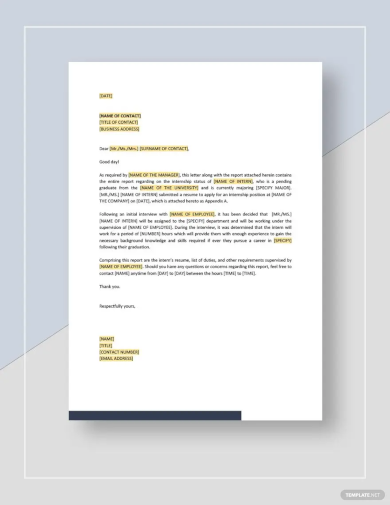
Student Internship Report
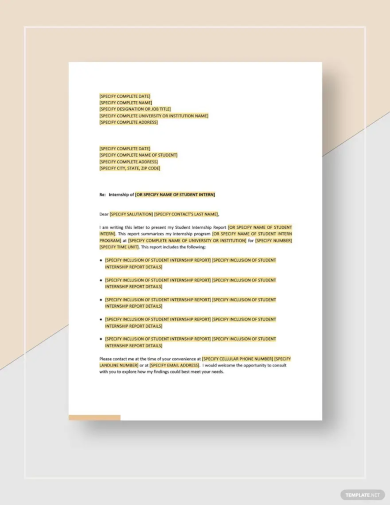
Free Advertising Agency Internship Report
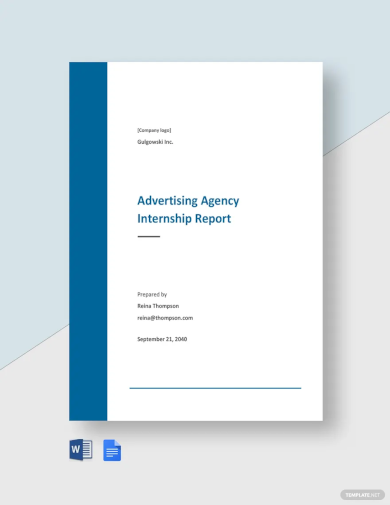
Weekly Report Template Example
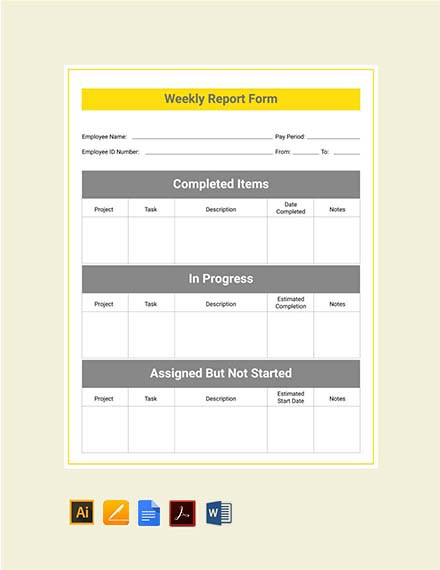
Monthly Report Template Example
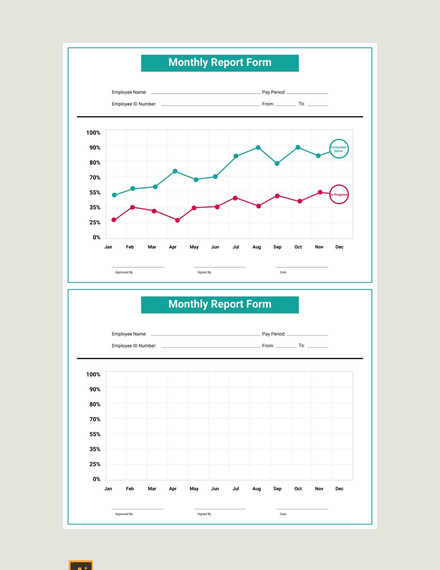
Student Internship Report

Internship Report

Report of the School Internship Example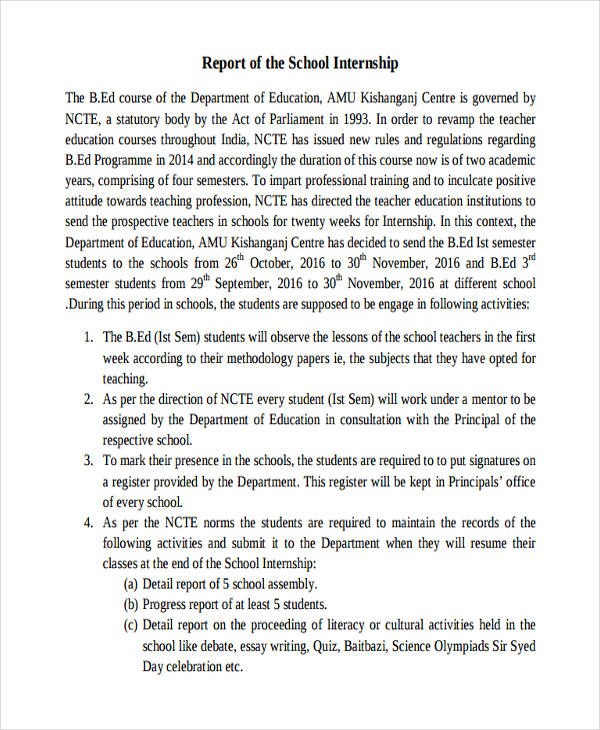
Download
Free Architectural Internship Report Example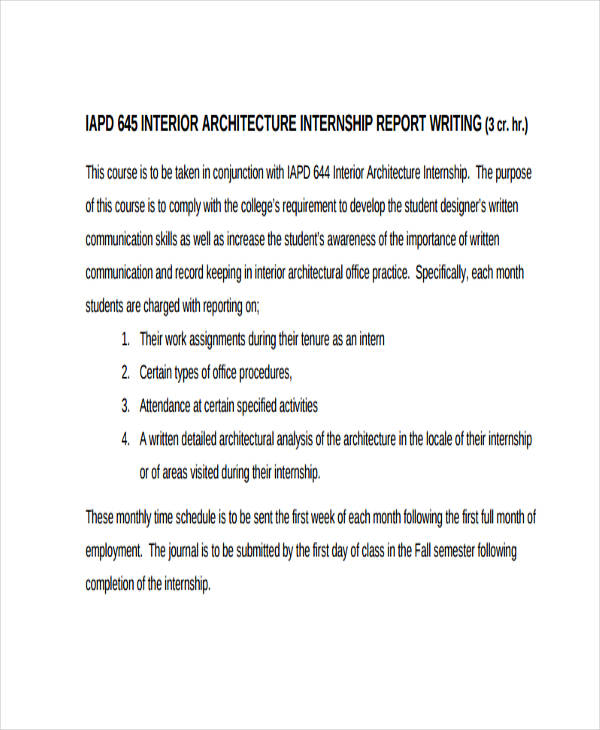
Download
Sample Internship Report Example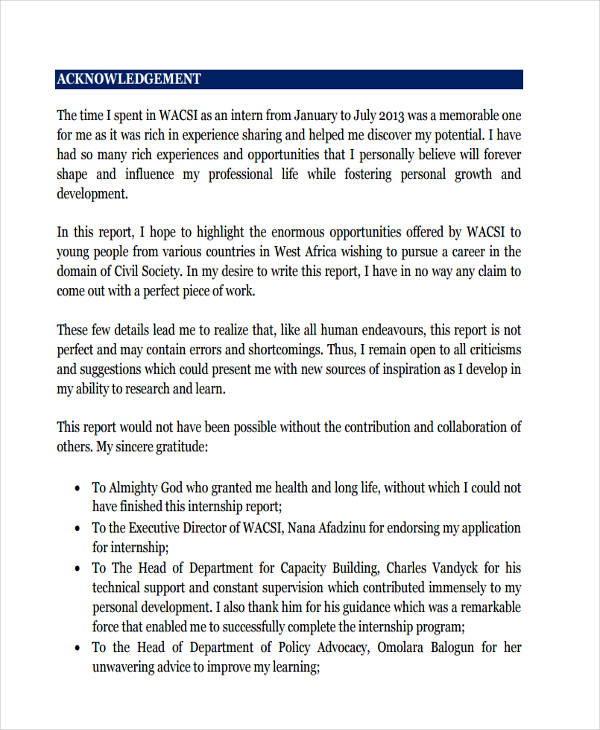
Download
Final Internship Report Example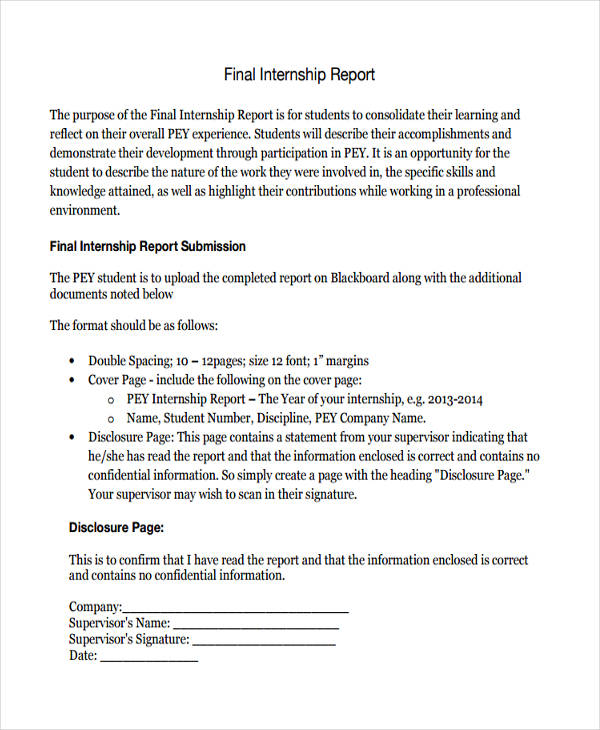
Download
College Internship Report Examples
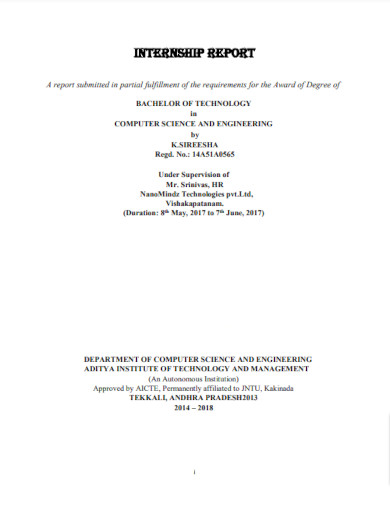
Summer Internship Report Examples
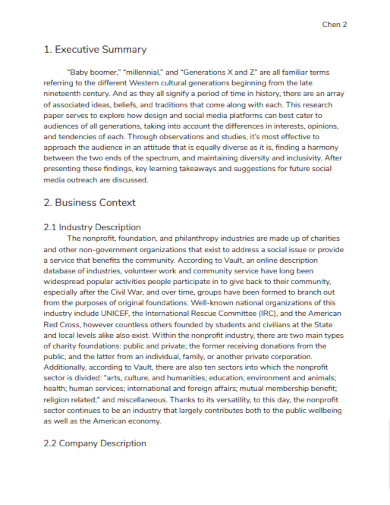
Internship Narrative Report Example
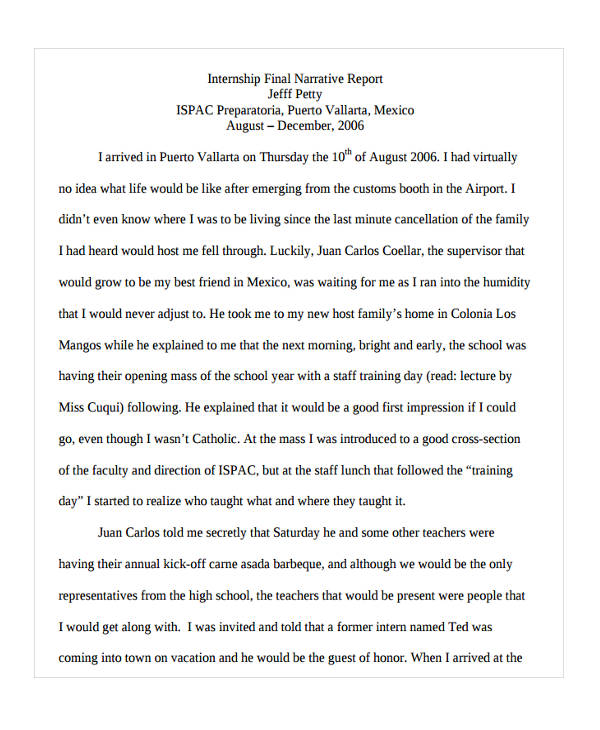
Internship Summary Report Example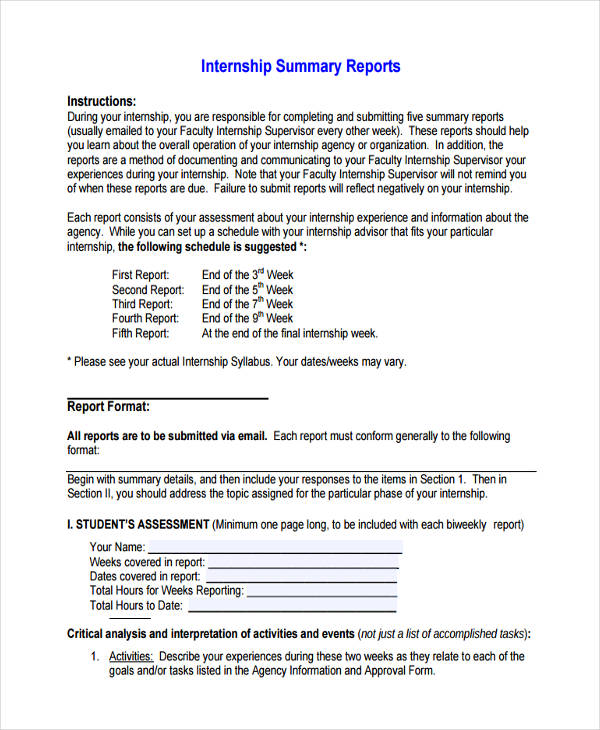
Download
Free Weekly Report Example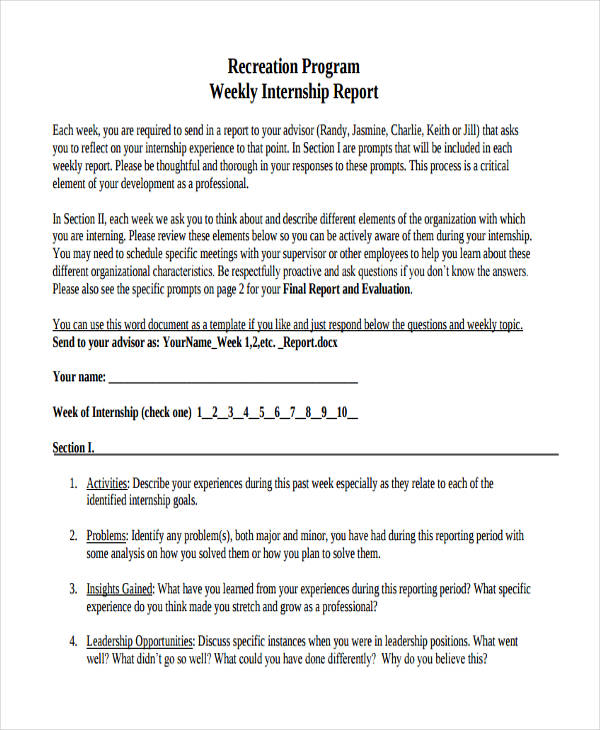
Download
Daily Work Report Example
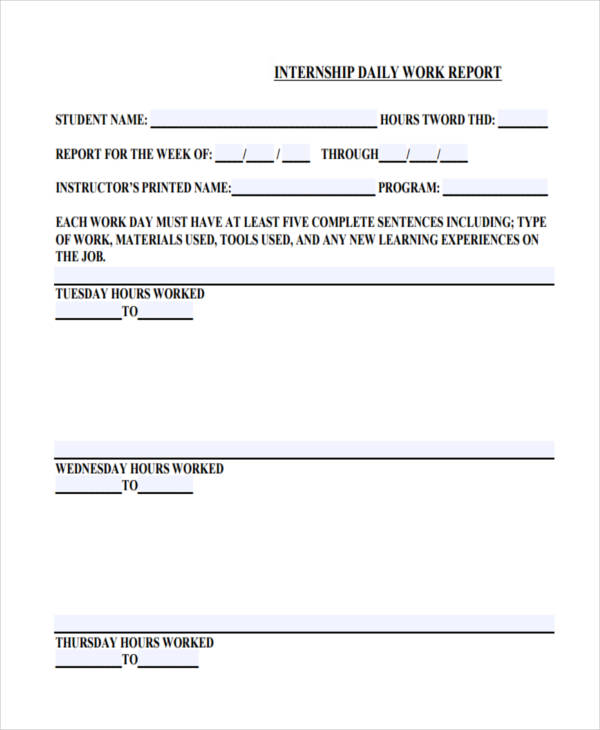
Internship Project Format Example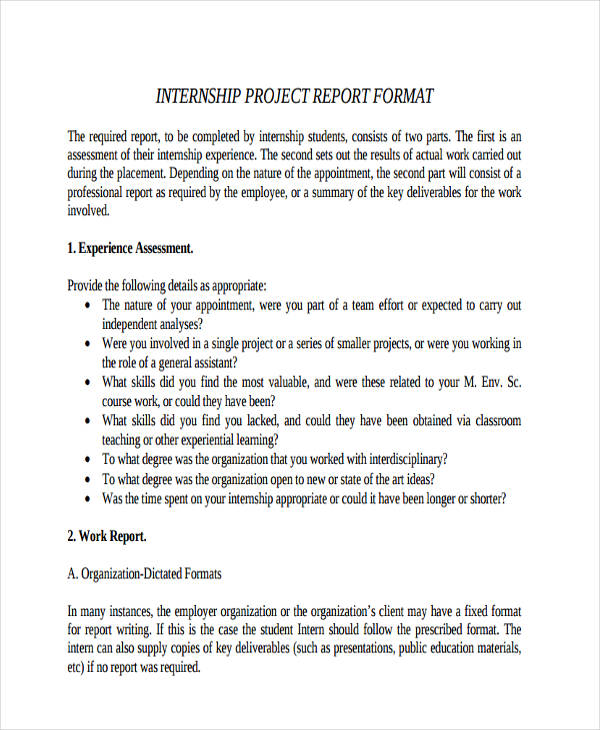
Download
Free Monthly Report Example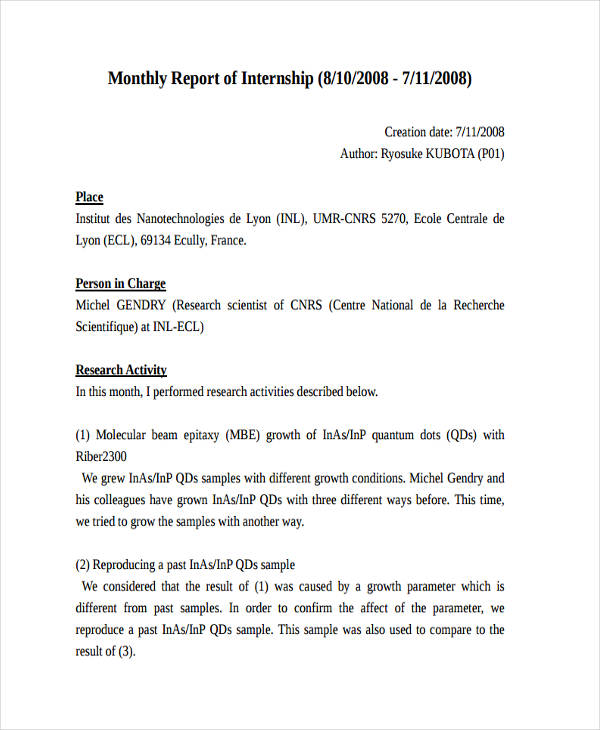
Download
How to Write an Acknowledgement for an Internship Report
The acknowledgement portion of your internship report pays special tribute to those responsible for making your internship possible. You may also see quality report examples.
If your progress report is good, there’s no doubt that you performed well. Of course, good performance reflects a good work environment. With this in mind, it’s time to formally express your thanks to the people behind your success. To do so, think about who you want to express your utmost gratitude to. This could be your parents, friends, adviser, and supervisor. You may also like consulting report examples.
Members of the organization who you consider to be significant may also be mentioned here.
What is the Purpose of an Internship Report?
Creating an internship report can be dreadful. You may be required to submit a daily report, a weekly report, or a monthly report of your internship. It can be exhausting and quite repetitive.
But an internship report actually has a purpose. An internship report would serve as a way for you to document your personal experiences, you can see this as a requirement or a moment of reflection. It is also used as a report form of evidence to prove that you have successfully completed your internship. It is a way for your adviser to assess the effectiveness of such program to a student’s growth.
How To Write an Effective Internship Report?
1. Understand the Purpose:
Before you begin, clarify the purpose and requirements of the internship report. Your report may be required for academic credit or as a part of your internship evaluation. Make sure you understand the specific guidelines and expectations.
2. Plan and Organize:
- Start by outlining the structure of your report. Common sections include an introduction, company overview, job description, tasks and responsibilities, achievements, challenges, personal development, and a conclusion.
- Determine the word limit or length requirements for each section to maintain consistency.
3. Introduction:
- Begin with a brief introduction that provides context. Mention the name of the organization, department, and the duration of your internship.
- State your objectives, what you expected to learn, and what you hope to achieve through the report.
4. Company Overview:
- Provide an overview of the company or organization. Include its history, mission, products/services, and any other relevant information.
- Discuss the company’s industry, market position, and its significance in the field.
5. Job Description:
- Describe your specific role and responsibilities. Outline the tasks you were assigned and the department or team you worked in.
- Include information on your reporting structure and the names of your supervisors or mentors.
6. Achievements:
- Highlight your accomplishments and contributions during the internship. Discuss specific projects, tasks, or goals you achieved.
- Use quantitative data, if possible, to quantify your contributions (e.g., “increased sales by 20%,” “handled 50 customer inquiries per day”).
7. Challenges:
- Mention any challenges or obstacles you encountered during your internship. This demonstrates your ability to overcome difficulties and adapt to new environments.
- Explain how you addressed these challenges and what you learned from them.
8. Personal Development:
- Reflect on the skills and knowledge you gained during the internship. Discuss how the experience has contributed to your personal and professional growth.
- Include any new skills or insights you acquired and how they will benefit your future career.
9. Conclusion:
- Summarize the key takeaways from your internship experience. Discuss what you’ve learned, both in terms of technical skills and personal development.
- Express your gratitude to the organization, your mentors, and colleagues for their support and guidance.
When is an Internship Report Necessary?
An internship report is necessary in several situations, primarily to document and reflect on your internship experiences. Here are some scenarios when you may need to prepare and submit an internship report:
1. Academic Requirement:
Many educational institutions, especially colleges and universities, require students to complete internships as part of their curriculum. In such cases, an internship report is often a mandatory component of the academic assessment. It helps faculty evaluate your learning and assess the practical application of your academic knowledge.
2. Internship Evaluation:
Some organizations require interns to submit reports as part of their internship evaluation process. These reports help employers gauge the interns’ performance, contributions, and their understanding of the company’s operations.
3. Career Development:
Preparing an internship report can be a valuable self-assessment tool. It allows you to reflect on your internship experience, assess your accomplishments, and identify areas where you can improve. This self-reflection is essential for personal and professional growth.
4. Job Applications:
Internship reports can be a useful addition to your job application materials, especially if your internship experience is relevant to the job you’re applying for. A well-written report can demonstrate your practical skills, problem-solving abilities, and understanding of the industry.
5. Grad School Applications:
If you plan to pursue graduate studies, particularly in a field related to your internship, an internship report can be a valuable addition to your application. It can demonstrate your real-world experience and your readiness for advanced academic work.
6. Future References:
Your internship report can serve as a reference document for future endeavors. It may be a valuable resource when you need to recall specific projects, experiences, or skills gained during your internship.
7. Personal Development:
Even when not explicitly required, creating an internship report is an excellent practice for personal development. It allows you to reflect on your experiences, identify strengths and weaknesses, and set goals for future career development.
What are Important Parts of an Internship Report?
1. Cover Page (if applicable):
Include your name, the title of the report, the name of the organization, your internship dates, and any other relevant details.
2. Table of Contents (if applicable):
Create a table of contents that lists the major sections and subsections of your report, along with page numbers.
3. Introduction:
Begin with a concise introduction that provides an overview of the report’s contents. Mention the purpose of the report, the organization where you interned, and the duration of your internship.
4. Company Overview:
Provide a brief introduction to the organization where you completed your internship. Include information about its history, mission, products or services, and its position in the industry.
5. Job Description:
Describe your specific role and responsibilities during the internship. Outline the tasks you were assigned, the department or team you worked with, and the goals of your internship position.
6. Tasks and Responsibilities:
Detail the specific tasks and responsibilities you undertook during your internship. Be specific and provide examples of projects, assignments, and any challenges you faced.
7. Achievements:
Highlight your accomplishments and contributions to the organization. Use quantitative data and specific examples to illustrate the impact of your work.
8. Challenges and Solutions:
Discuss any challenges you encountered during your internship and how you addressed them. This demonstrates your problem-solving skills and adaptability.
9. Skills and Knowledge Gained:
Reflect on the skills, knowledge, and insights you gained during the internship. Explain how these experiences contributed to your personal and professional development.
10. Conclusion:
Summarize the key takeaways from your internship. Discuss what you’ve learned and how it has prepared you for future career opportunities.
FAQ’s
How Long is an Internship Report?
The length of an internship report varies, typically ranging from a few pages to over 30 pages, depending on specific requirements and the depth of your internship experience.
How do you Introduce an Internship Report?
Introduce your internship report with a brief statement of its purpose, organization’s name, and internship duration, providing context for what the report will cover.
How do you Write a Simple Internship Report?
Write a simple internship report by introducing yourself and the organization briefly. Describe tasks, challenges, and achievements concisely. Reflect on learning experiences and conclude by summarizing key takeaways.
How do you write an internship report certificate?
An internship report certificate is a formal document usually provided by the host organization or supervisor, certifying your completion of the internship. It should include:
- Title: Clearly state that it is an Internship Certificate.
- Recipient’s Name: The intern’s full name.
- Statement of Certification: A sentence stating that the certificate is awarded for successfully completing the internship.
- Internship Details: Brief details about the internship, including duration, role, and main responsibilities or projects.
- Acknowledgment: A statement recognizing the intern’s contributions.
- Date: The date of issuance.
- Signatures: Signed by the authorizing official, usually the intern’s supervisor or a company executive.
- Company Seal or Logo: If available, for authenticity.
What is an internship application form?
An internship application form is a document designed by organizations for potential interns to fill out when applying for an internship position. It typically includes:
- Personal Information: Name, contact details, and sometimes personal identification numbers.
- Educational Background: Details about the applicant’s current or completed educational courses, institutions, and grades.
- Work Experience: Any previous work experience, including part-time jobs or volunteer work.
- Skills and Qualifications: Special skills or certifications relevant to the internship.
- Internship Details: Preferences regarding internship duration, department, and role if applicable.
- Statement of Purpose: A section for the applicant to write about their motivation for applying and what they hope to gain from the internship.
- References: Contact information for academic or professional references.


